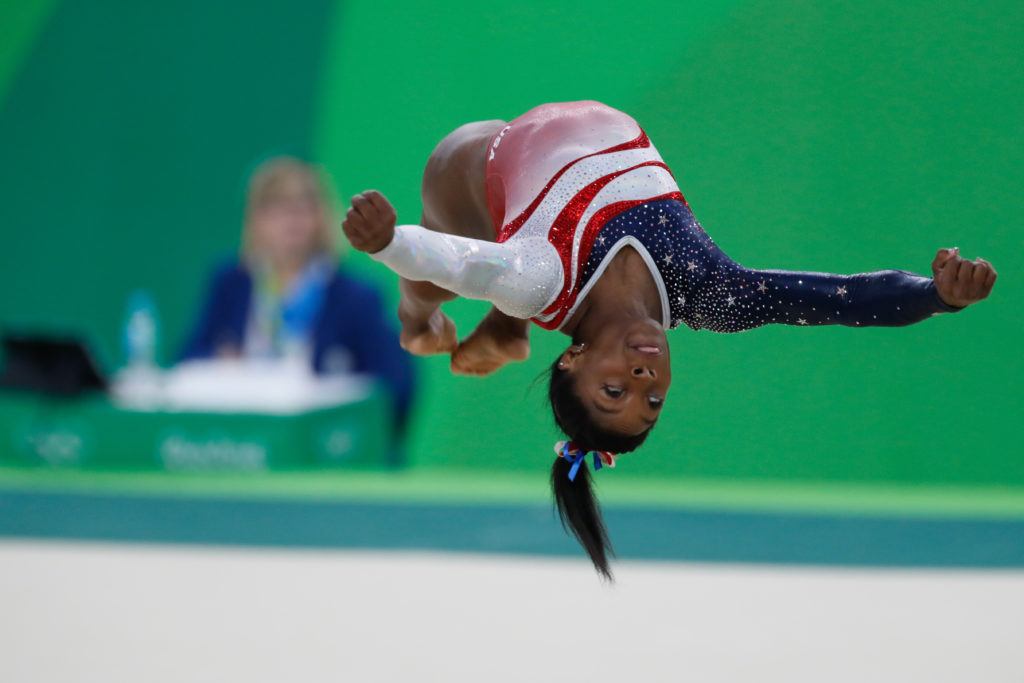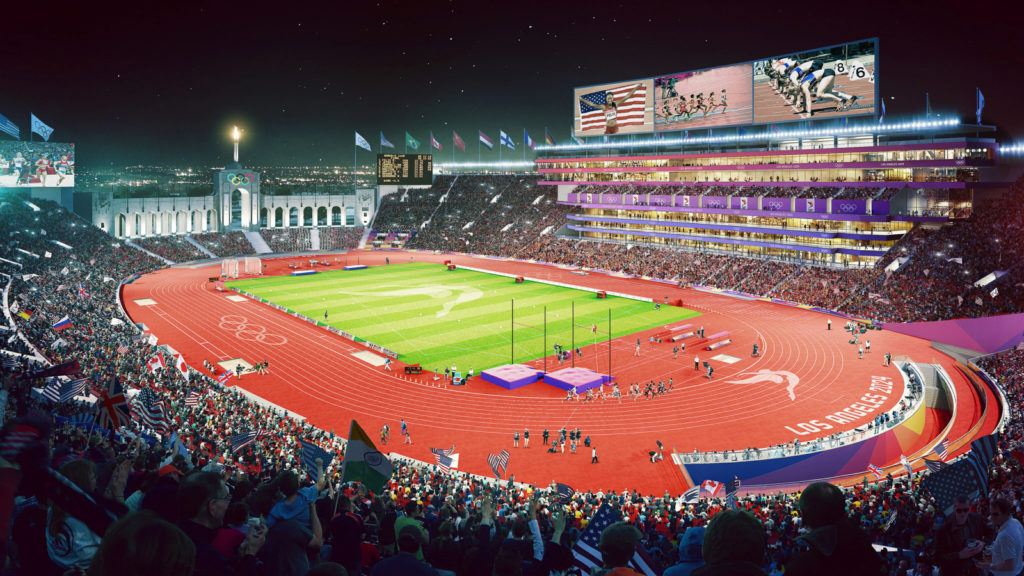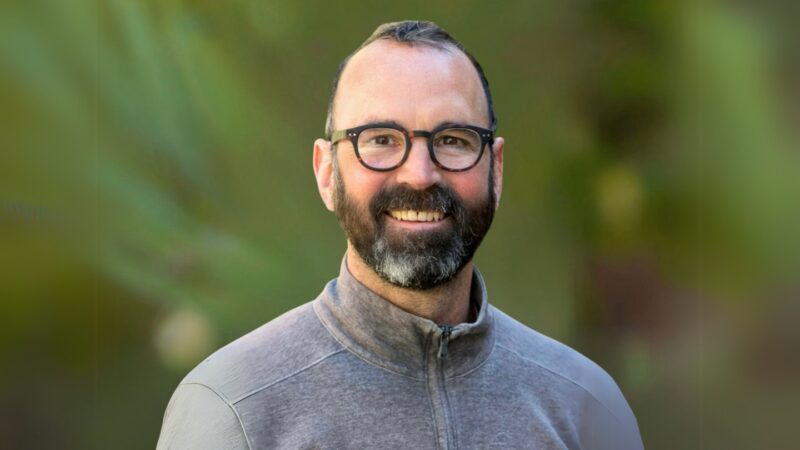
UCLA helps L.A. pitch greenest Olympics ever
The International Olympic Committee (IOC) wants prospective host cities to provide game plans that ensure all future Olympics and Paralympics are sustainable low-carbon events. For the two cities vying to host the 2024 games, Los Angles and Paris, it may come down to which has the green edge.
Los Angeles’ Olympic organizing committee—L.A. 2024—has bold plans to hold the first energy-positive, zero-waste games while providing long-term benefits to Angelenos.
Last week, L.A. 2024 pitched what would be the most sustainable games in modern history to visitors from the International Olympic Committee (IOC) at the StubHub Center’s South Bay Sports Park in Carson. The multi-sport park was designated the bid’s official “Green Sports Park,” with state-of-the-art green technology such as onsite stormwater management, community and rooftop solar energy, and fuel cell power regeneration.
At the event, L.A. 2024 introduced its Sustainability and Legacy Committee—featuring some of UCLA’s top environmental experts.
Brence Culp, L.A. 2024 sustainability and legacy director, said partners like UCLA are vital to achieve the bid’s lofty sustainability goals. Which include generating more renewable energy than the games use, zero waste, using existing venues and infrastructure, accounting for all water use, investing $640 million in community well being and fitness programs, and ensuring 100 percent public transport or ridesharing for spectators.
“It’s great working with people who have scientific backgrounds but also understand that at the end of the day, the reason we take care of our environment is because people depend on it—so really it’s a way of taking care of people,” Culp said.
She also likened L.A. 2024’s mission to environmental stewardship. “It’s basically built on the same principle we were all told when we went camping as kids: If you enter an environment, leave it better than it was.”
Los Angeles has already committed to a cleaner low-carbon future. L.A. 2024’s greenest tactic of all is “radical re-use”—relying on L.A.’s existing world-class sporting venues and universities without building permanent new facilities.
No new permanent construction will be a major factor in creating a zero-waste games, said UCLA’s chief sustainability officer, Nurit Katz, who’s working closely with L.A. 2024. “Fundamentally the biggest impact of the games from a waste perspective would be the construction materials,” she said. “By using existing venues, there’s already a huge savings in waste.”
Nowhere would the model be better displayed than Los Angeles Memorial Coliseum. The 2024 games would be the storied venue’s third Olympics since opening in 1923. The stadium already operates as a zero-waste venue. UCLA is also part of the re-use strategy – it’ll house athletes in the Olympic and Paralympic Village. And Pauley Pavilion is slated to host the judo and sitting volleyball competitions.

One of the biggest challenges of the bid is tackling Los Angeles’ notorious traffic congestion. Thanks to voter-approved sales tax measures, help is on the way, with $88 billion planned to be spent to expand public transportation by 2024. Bid organizers expressed confidence that all spectators will get around by public transportation and ridesharing. They also hope to spur transit ridership by locals, showing them how easy it is to use the system, even during one of the world’s most massive events.
While generating long-term behavioral change is one of the most challenging aspects of sustainability, something as big and exciting as the Olympics can drive change, UCLA’s Katz said. “UCLA’s vanpool program was started during the 1984 Olympics and continues today with 150 vans transporting employees from all over the greater L.A. area.” Today, UCLA’s single car commuting rate remains 20 percent below the average for L.A. County.
L.A. 2024’s planned water-wise practices and net-positive renewable energy targets are in line with the Mayor Eric Garcetti’s Sustainable City pLAn. The mayor’s office has already enlisted the help of UCLA’s Sustainable L.A. Grand Challenges to help meet emissions reductions and water independence targets.
In 2015, the IOC committed to sustainable development of cities as part of its planning guidelines. The goal is to develop low cost, low risk practices that provide lasting well-being for host communities.
The Olympics traditionally unite the world for friendly competition around sports. Peter Karieva, director of UCLA’s Institute of the Environment and Sustainability, said he thinks they could do the same for the environment.
“Thanks to the mayor’s leadership, L.A. is already heading towards sustainability. The Olympics could make that happen faster, and could spur other cities to try and keep up with us. How cool is that?”
For now, the stiffest competition is between the bidding cities. The IOC has already given both Paris and Los Angeles rave reviews, suggesting that the losing city could host the 2028 games. For their part, French organizers said they are adamant that they only want 2024, which would create symmetry with the last time they hosted the Olympics, 1924.
L.A. also vowed that it’s 2024 or bust, but at the end of last week’s IOC visit, Mayor Garcetti said he’d consider 2024 or 2028 as wins.
Final hosting decisions for both games will be made this September.
Feature photograph: Simone Biles (who’s verbally committed to attend UCLA) at Olympic Games in Rio de Janeiro, 2016.
Second photograph: L.A. 2024 rendering of Los Angeles Memorial Coliseum for 2024 Olympics.
Published:




